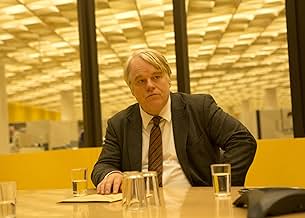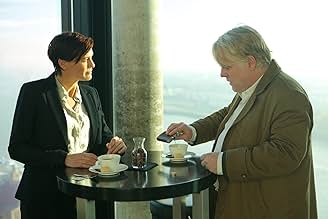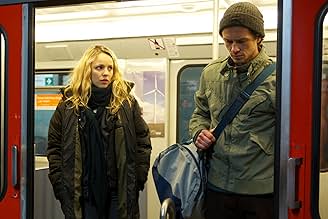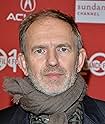A Chechen Muslim illegally immigrates to Hamburg, where he gets caught in the international war on terror.A Chechen Muslim illegally immigrates to Hamburg, where he gets caught in the international war on terror.A Chechen Muslim illegally immigrates to Hamburg, where he gets caught in the international war on terror.
- Director
- Writers
- Stars
- Awards
- 3 wins & 6 nominations total
Neil Malik Abdullah
- Abdullah's Bodyguard
- (as Neil Melik Abdullah)
- Director
- Writers
- All cast & crew
- Production, box office & more at IMDbPro
6.783.8K
1
2
3
4
5
6
7
8
9
10
Featured reviews
A Fine Goodbye for Philip Seymour Hoffman
The final moments of Anton Corbijn's latest film A Most Wanted Man are both gratifying and poetic. Starring an impeccable cast that includes the late Philip Seymour Hoffman, Rachel McAdams, Willem Dafoe, and Robin Wright, the film is based on the novel by John le Carré, and is a tension-driven and smartly paced thriller ride that makes a mark as one of the year's best rides.
A movie that is more in the vein of an extended episode of "Homeland" than a full-out feature (which is not exactly an insult), is tightly wound, fish hooking the audience with its clever storytelling abilities. Corbijn creates a meticulous and subtle picture that unravels itself with suspense and excitement. The movie challenges the audience in attempting to follow each detail and fully understand what is going on. That might be a turn off to many. Like many of Carré's books that have been translated to film like Tinker, Tailor, Soldier, Spy and The Constant Gardener, there's an aura that exudes from the screen that you want to take home with you. There's so much to the story that happens before the film and starts and long after the movie ends but you're satisfied with that. Adapted by Andrew Bovell, the Australian screenwriter may have penned the film of his career.
The elephant in the room is the performance of Philip Seymour Hoffman. It's very hard to not want the film to end because you are very aware that this will be one of the last times you see a new film by this actor. One of the greatest actors to have ever lived, Hoffman shows exactly why his omission from our world is such a loss. Subtle, electrifying, and profoundly real, Hoffman's "Gunther Bachmann" is an intriguing force that demands the audience's attention with the simplicity of a tone or look. While the tween world waits on the arrival of the final two installments to The Hunger Games, this film felt more of his goodbye to the film community that has appreciated him for over two decades.
One of the pleasant surprises of the film is the beautiful and talented Rachel McAdams, which immediately makes you think, "where has she been?"
While she has been making her rounds in independent films like Passion, About Time, and To the Wonder, her role as "Annabel" shows a deeper talent that is aching to be realized by the right director. Internalizing emotions and releasing only when called upon, McAdams turns in her one of her strongest turns yet. Not your A-typical "damsel in distress" or "unbelievable tough chick," McAdams reinvents a character that could have just laid on the screen with no emotion. She relaxes herself into the role, working well off some of the screen's most gifted performers. It's a magnificent work.
With no real arc or allowance to his character, Willem Dafoe unfortunately distracts for much of the film. Feeling like he's part of the Osborne family again, his role is rather underwritten and a bit of a mystery but not one you're aching to learn more about. Robin Wright utilizes her sensational appeal and charismatic nature to sprinkle a dash of brilliance to the film's narrative. As "Issa," Grigoriy Dobrygin keeps the viewer at a distance, never allowing his true motives to unleash. He constantly asks the viewer to question our own judgment. He is very impressive.
With a gritty yet polished aesthetic, Corbijn knows exactly how he wants his film to look and feel. Using Cinematographer Benoît Delhomme keeps the tension at the very brim of explosion. Composer Herbert Grönemeyer, who also has a role in the film as "Michael," lays out a soothing, relentless score that is both memorable and undeniable.
A Most Wanted Man is smart and precise, an espionage thriller that stands out as one of the best of its kind in quite some time. It's confident in its approach and doesn't shy away from its central purpose. It's a morality tale that engulfs your conscience with terrifying and difficult questions. I don't mind being asked them every now and again. It's one of the year's best.
Read more @ The Awards Circuit (http://www.awardscircuit.com)
A movie that is more in the vein of an extended episode of "Homeland" than a full-out feature (which is not exactly an insult), is tightly wound, fish hooking the audience with its clever storytelling abilities. Corbijn creates a meticulous and subtle picture that unravels itself with suspense and excitement. The movie challenges the audience in attempting to follow each detail and fully understand what is going on. That might be a turn off to many. Like many of Carré's books that have been translated to film like Tinker, Tailor, Soldier, Spy and The Constant Gardener, there's an aura that exudes from the screen that you want to take home with you. There's so much to the story that happens before the film and starts and long after the movie ends but you're satisfied with that. Adapted by Andrew Bovell, the Australian screenwriter may have penned the film of his career.
The elephant in the room is the performance of Philip Seymour Hoffman. It's very hard to not want the film to end because you are very aware that this will be one of the last times you see a new film by this actor. One of the greatest actors to have ever lived, Hoffman shows exactly why his omission from our world is such a loss. Subtle, electrifying, and profoundly real, Hoffman's "Gunther Bachmann" is an intriguing force that demands the audience's attention with the simplicity of a tone or look. While the tween world waits on the arrival of the final two installments to The Hunger Games, this film felt more of his goodbye to the film community that has appreciated him for over two decades.
One of the pleasant surprises of the film is the beautiful and talented Rachel McAdams, which immediately makes you think, "where has she been?"
While she has been making her rounds in independent films like Passion, About Time, and To the Wonder, her role as "Annabel" shows a deeper talent that is aching to be realized by the right director. Internalizing emotions and releasing only when called upon, McAdams turns in her one of her strongest turns yet. Not your A-typical "damsel in distress" or "unbelievable tough chick," McAdams reinvents a character that could have just laid on the screen with no emotion. She relaxes herself into the role, working well off some of the screen's most gifted performers. It's a magnificent work.
With no real arc or allowance to his character, Willem Dafoe unfortunately distracts for much of the film. Feeling like he's part of the Osborne family again, his role is rather underwritten and a bit of a mystery but not one you're aching to learn more about. Robin Wright utilizes her sensational appeal and charismatic nature to sprinkle a dash of brilliance to the film's narrative. As "Issa," Grigoriy Dobrygin keeps the viewer at a distance, never allowing his true motives to unleash. He constantly asks the viewer to question our own judgment. He is very impressive.
With a gritty yet polished aesthetic, Corbijn knows exactly how he wants his film to look and feel. Using Cinematographer Benoît Delhomme keeps the tension at the very brim of explosion. Composer Herbert Grönemeyer, who also has a role in the film as "Michael," lays out a soothing, relentless score that is both memorable and undeniable.
A Most Wanted Man is smart and precise, an espionage thriller that stands out as one of the best of its kind in quite some time. It's confident in its approach and doesn't shy away from its central purpose. It's a morality tale that engulfs your conscience with terrifying and difficult questions. I don't mind being asked them every now and again. It's one of the year's best.
Read more @ The Awards Circuit (http://www.awardscircuit.com)
slow murky spy thriller
Günther Bachmann (Philip Seymour Hoffman) is a hard drinking German security agent spying on Hamburg's Muslim community and philanthropist Abdullah. Issa Karpov is an illegal that The Americans Martha Sullivan (Robin Wright) claims to be a Chechen terrorists. Bachmann wants to use him to make contact with an unknown banker. Refugee lawyer Annabel Richter (Rachel McAdams) takes on Karpov's case. He tells her to contact banker Tommy Brue (Willem Dafoe) about a mysterious account of over 10 Million Euros left by his Russian military commander father.
It's an interesting murky spy thriller from John le Carré. However it lacks any intensity. Hoffman delivers yet another solid performance. The plot demands intense energy but the movie doesn't allow it. I don't like the fake accented English from North American actors either. It makes the movie feel artificial. All the performances are solid but heavy. Everybody is prodding. There is simply no energy, no tension and no drive.
It's an interesting murky spy thriller from John le Carré. However it lacks any intensity. Hoffman delivers yet another solid performance. The plot demands intense energy but the movie doesn't allow it. I don't like the fake accented English from North American actors either. It makes the movie feel artificial. All the performances are solid but heavy. Everybody is prodding. There is simply no energy, no tension and no drive.
Spy Work: Gritty, Dirty and Glamor-Free
The plot hardly matters here; it's only a vehicle for exploring the dirty side of intelligence work and is complicated as a Swiss watch. Maybe the NSA revelations have you thinking twice about spywork? The fact that we caught spying on our own allies, the Germans, adds a special relevance to this tale. But the real appeal here is a)LeCarre's dark, dark, dark worldview and b) Hoffman's superb acting. He just tosses this role off, and is utterly convincing. After you see this you should see the film that perfectly bookends it: LeCarre's early '60s The Spy Who Came in From the Cold. Just as gritty and dirty and with Richard Burton as Alec Leamus. Like Gunther Bachmann,Leamus was a worn-out, beat-up, used-up operative, and audiences of the time, entranced by the frivolities of James Bond, were rather shocked by the dose of reality he represented.
John le Carré wrote it; Philip Seymour Hoffman performed it
A Most Wanted Man (2014) was directed by Anton Corbijn. It's based on a novel by John le Carré. The film stars Philip Seymour Hoffman. Basically, that's all you need to know about this movie.
Philip Seymour Hoffman is Günther Bachmann, a self-described spy. (Actually a counter-intelligence agent.) He's involved with a Chechen immigrant who has been tortured. There's money going from Hamburg to terrorists, but no one knows how this money gets there. Somehow the Chechen is involved. On and on it goes, with the German police opposing Günther, the CIA opposing Günther, and everyone betraying everyone else.
Günther is burned out and, essentially, has no life other than being a spy. As far as we can see, he never takes time off, he is interested in nothing other than work, and he has no friends and no colleagues he can trust. Hoffman portrays this part perfectly. No one could have done it as well.
A Most Wanted Man is pure Carré, and pure Hoffman, and that's why you should see it. If you're not impressed with Carré, or not impressed with Hoffman, there's no point going to the film.
We saw the movie on the large screen at the wonderful Dryden Theatre in Rochester, NY. However, it will work just as well on the small screen. No scuba shots, no mountain skiing shots--this isn't James Bond. If you know what to expect--gritty shots of Hamburg, Germany--you won't be disappointed, and the movie will work for you.
Philip Seymour Hoffman is Günther Bachmann, a self-described spy. (Actually a counter-intelligence agent.) He's involved with a Chechen immigrant who has been tortured. There's money going from Hamburg to terrorists, but no one knows how this money gets there. Somehow the Chechen is involved. On and on it goes, with the German police opposing Günther, the CIA opposing Günther, and everyone betraying everyone else.
Günther is burned out and, essentially, has no life other than being a spy. As far as we can see, he never takes time off, he is interested in nothing other than work, and he has no friends and no colleagues he can trust. Hoffman portrays this part perfectly. No one could have done it as well.
A Most Wanted Man is pure Carré, and pure Hoffman, and that's why you should see it. If you're not impressed with Carré, or not impressed with Hoffman, there's no point going to the film.
We saw the movie on the large screen at the wonderful Dryden Theatre in Rochester, NY. However, it will work just as well on the small screen. No scuba shots, no mountain skiing shots--this isn't James Bond. If you know what to expect--gritty shots of Hamburg, Germany--you won't be disappointed, and the movie will work for you.
Philip Seymour Hoffman: A most missed man
Anton Corbijn's third feature is a solemn thriller that connects topical geo-social politics with the mundanity of everyday spycraft. It occupies the same brown-drenched bureaucratic landscape as an earlier John Le Carre adaptation, Tinker Tailor Soldier Spy. But while Tomas Alfredson's film was all about its dreary '70s setting, A Most Wanted Man brings the dreariness into the realm of post-9/11 (or 11/09, to give it a region-appropriate designation).
The plot is typically detailed and dense. Not so much twisty as, well, untrusting. A young Chechen man named Karpov (Grigoriy Dobrygin) washes up in Hamburg, seeking asylum. He's an illegal immigrant promised a vast sum of dirty money by his late father. It's money he doesn't want. Gunther Bachmann (Philip Seymour Hoffman) and his espionage team, via an idealistic lawyer (Rachel McAdams), arrange for Karpov to donate the inheritance to a high-profile Muslim philanthropist, in order to entrap the latter as he siphons the funds into a terrorist organisation. Naturally, things get messy, and the movie spends most of its time in a very grey area indeed.
After Control and The American, Corbijn is exploring another talented, troubled man, adrift and alone in a thankless world. The film belongs to Seymour Hoffman, transforming yet again, embodying the chain-smoking, coffee-spiking, yet professional spy at the story's heart. We know few facts about Bachmann, yet we feel like we know him (which is perhaps the definition of a great screen character). He's taciturn and monotone; haggard and stooped yet quietly confident, as if he's seen it all and won enough times to keep going. Just.
So, it's an actor's movie. Robin Wright revels in a snaky supporting role, representing the brutal pragmatism of the U.S., and Rachel McAdams makes the most of a gruelling role as a woman trying to do good in a world that rewards evil equally often.
Corbijn's film doesn't give away the magician's tricks – we are usually one step behind Gunther and his crew, watching as their plans unfold and succeed or fail before our eyes. It keeps the narrative ticking along, albeit slowly.
The pace isn't my main problem – it's the insufficient sense of danger. I don't think this is to do with the lack of car chases or scarily efficient murders. What's lacking is the shadow of imminent loss. A better film starring Seymour Hoffman such as The Ides of March managed this, so why not A Most Wanted Man? Perhaps it's more generic than it first appears. I mean, once the main players are introduced, it's fairly predictable how things will turn out; who the real bad guys will be. It feels like there's a killer moment – a scene of real cinematic distinction – missing from the movie.
And what about Karpov? I never got a handle on his plight. I was never moved by his agonising principles. It's as if Corbijn is so focused on nailing the minutiae of espionage that he forgot about the subtleties of the heart.
Slow, precise, atmospheric – all good things, although this is less emotionally involving than Control and not as bold and distinctive as The American. It's a mature, well-written, ensemble film, but one which lacks the oppressive dread and nail-biting urgency to be truly memorable.
We will, however, remember its supremely talented star. In the final shot, we realise how appropriate a swansong this is for the great, big man: understated, ambiguous, and secretly sad.
The plot is typically detailed and dense. Not so much twisty as, well, untrusting. A young Chechen man named Karpov (Grigoriy Dobrygin) washes up in Hamburg, seeking asylum. He's an illegal immigrant promised a vast sum of dirty money by his late father. It's money he doesn't want. Gunther Bachmann (Philip Seymour Hoffman) and his espionage team, via an idealistic lawyer (Rachel McAdams), arrange for Karpov to donate the inheritance to a high-profile Muslim philanthropist, in order to entrap the latter as he siphons the funds into a terrorist organisation. Naturally, things get messy, and the movie spends most of its time in a very grey area indeed.
After Control and The American, Corbijn is exploring another talented, troubled man, adrift and alone in a thankless world. The film belongs to Seymour Hoffman, transforming yet again, embodying the chain-smoking, coffee-spiking, yet professional spy at the story's heart. We know few facts about Bachmann, yet we feel like we know him (which is perhaps the definition of a great screen character). He's taciturn and monotone; haggard and stooped yet quietly confident, as if he's seen it all and won enough times to keep going. Just.
So, it's an actor's movie. Robin Wright revels in a snaky supporting role, representing the brutal pragmatism of the U.S., and Rachel McAdams makes the most of a gruelling role as a woman trying to do good in a world that rewards evil equally often.
Corbijn's film doesn't give away the magician's tricks – we are usually one step behind Gunther and his crew, watching as their plans unfold and succeed or fail before our eyes. It keeps the narrative ticking along, albeit slowly.
The pace isn't my main problem – it's the insufficient sense of danger. I don't think this is to do with the lack of car chases or scarily efficient murders. What's lacking is the shadow of imminent loss. A better film starring Seymour Hoffman such as The Ides of March managed this, so why not A Most Wanted Man? Perhaps it's more generic than it first appears. I mean, once the main players are introduced, it's fairly predictable how things will turn out; who the real bad guys will be. It feels like there's a killer moment – a scene of real cinematic distinction – missing from the movie.
And what about Karpov? I never got a handle on his plight. I was never moved by his agonising principles. It's as if Corbijn is so focused on nailing the minutiae of espionage that he forgot about the subtleties of the heart.
Slow, precise, atmospheric – all good things, although this is less emotionally involving than Control and not as bold and distinctive as The American. It's a mature, well-written, ensemble film, but one which lacks the oppressive dread and nail-biting urgency to be truly memorable.
We will, however, remember its supremely talented star. In the final shot, we realise how appropriate a swansong this is for the great, big man: understated, ambiguous, and secretly sad.
Soundtrack
Preview the soundtrack here and continue listening on Amazon Music.
Did you know
- TriviaThis film's story is set in Hamburg. Source novel author John le Carré worked for British intelligence's MI5 and MI6 during the 1950s and 1960s and worked in both Berlin and Hamburg. Le Carré was in Berlin when the Berlin Wall was being constructed and has worked as both a consul and an agent in Hamburg.
- GoofsBoth the folder and the file card associated with the safe-deposit box indicate that it is number 3148, but Brue reads the number aloud as 3448, and that is also how the English subtitle identifies the box number.
- Quotes
Dieter Mohr: After 24 hours of questioning, Karpov confessed to taking part in attacks on gas pipelines, transport, infrastructure, police stations.
Irna Frey: After 24 hours of Russian questioning, any one of us would admit to anything.
- ConnectionsFeatured in SPYMASTER: John le Carré in Hamburg (2014)
- SoundtracksTo Hell With Poverty
Written by Dave Allen, Hugo Burnham (as Hugo H. Burnham, Andy Gill (as Andrew Gill) and Jon King
Produced and Mixed by Andy Gill
Performed by Gang of Four
© Bug Music Ltd (GB) / WB Music Corp. (ASCAP) / Hugo Burnham Pub. Des. (ASCAP) / Elastic Purejoy Music (ASCAP)
All Rights on Behalf of Elastic Purejoy Music (ASCAP) & Hugo Burnham Pub. Des. (ASCAP) Administered by Neue Welt Musikverlag GmbH & Co. KG
With Kind Permission of BMG Rights Management_GmbH (Germany) and Neue Welt Musikverlag GmbH & Co. KG
(P) With Kind Permission of Gang of Four
- How long is A Most Wanted Man?Powered by Alexa
Details
- Release date
- Countries of origin
- Official sites
- Languages
- Also known as
- El hombre más buscado
- Filming locations
- Production companies
- See more company credits at IMDbPro
Box office
- Budget
- $15,000,000 (estimated)
- Gross US & Canada
- $17,237,855
- Opening weekend US & Canada
- $2,687,227
- Jul 27, 2014
- Gross worldwide
- $36,233,517
- Runtime
- 2h 2m(122 min)
- Color
- Sound mix
- Aspect ratio
- 2.35 : 1
Contribute to this page
Suggest an edit or add missing content














































